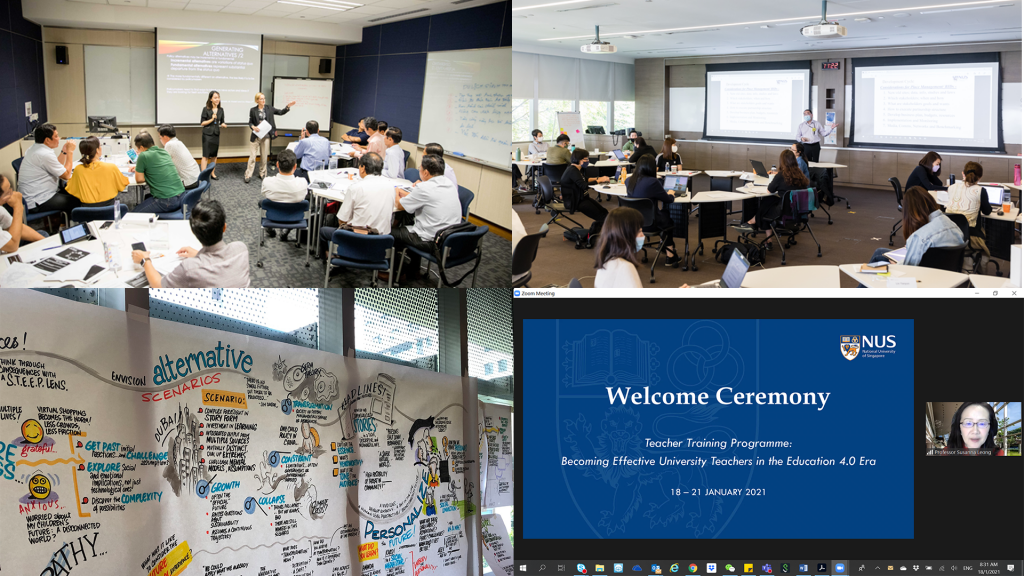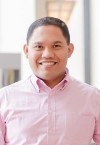Paving the way for a future-ready workforce
August 3, 2021

| By Miriam Jacqueline Green, Erik Johan Hertzman, and McRhon Banderlipe |
To help individuals and businesses weather the pandemic, Singapore’s fourth stimulus budget (passed in May 2020) included funding for a package to create 40,000 jobs; 25,000 traineeships; and 30,000 skills training headcounts. As part of this effort, NUS agreed to provide 6 months of skills training to help job seekers learn new and in-demand skills, and to facilitate their re-entry into the workforce as the economy picks up again.
Besides the training courses, NUS has worked to ensure that there are real jobs waiting for those who participate in the program. Work placements act as incentives and make jobseekers see real value in the courses, helping them persevere through challenging circumstances. NUS also extended its counselling services to provide personal support to program participants, and to help with motivation. Participants receive a training allowance from the government.
By keeping a watchful eye on the future and maintaining a willingness to innovate, NUS continues to respond to economic and employment shifts. Our flexibility also enabled us to respond to the pandemic rapidly and with less disruptions on learning.
Re-imagining the future
With a commitment to high-quality teaching, carefully designed curricula, and an emphasis on experiential learning, NUS is preparing its students for the rapidly changing workplace of today and tomorrow.
In AY2021/22, NUS will establish the NUS College of Humanities and Sciences, a collaboration between our Faculty of Arts and Social Sciences, and the Faculty of Science. Students in the College will have flexibility in degree choices (Bachelor of Arts, Bachelor of Science or Bachelor of Social Sciences), and access to cross-disciplinary opportunities.
They will also receive a strong foundation in reading, writing, critical thinking, and numeracy—skill sets that employers value. This shift from NUS’ traditional discipline-centric approach to a flexible, broad-based education will enhance the educational quality, market relevance, and learning experience of our students. It will prepare our graduates to not only thrive in, but to shape the future.
Challenging perceptions, enhancing interactions with stakeholders
The interaction of the key actors in the lifelong learning agenda—target participant(s) at the micro level; the support of employers and presence of the learning program providers at the meso level (in this case, NUS); and the state at the macro level could affect the level and extent of an individual’s participation in any learning program. As such, it is important to consider these relationships when designing and implementing innovative learning programs.
We argue that Singapore’s initiatives to promote lifelong learning demonstrate an attempt to break down the dominant barriers—a preference for merit- and degree-based credentials, lack of expanded and flexible approaches to learning, and a siloed environment and lack of interaction among disciplines. Although these challenges are similar to those faced by other universities, Singapore’s lifelong learning activities were fueled with substantial funding from the government.
Also, NUS responded to these challenges by offering programs that permit interdisciplinary collaboration, more self-directed and experiential learning activities, and sequential credentialing to focus on teaching key skills students can immediately apply in their current and future workplaces. However, the preference for paper-based qualifications is still embedded in the cultural and social psyche of the citizens.
Macro and meso-level actors could do more to challenge these perceptions; in redefining the definitions of success of learning and providing more options for graduates to excel; and in working with individuals on how they can potentially contribute their talents and skills to meet the needs of society. In addition, continued engagements with families, voluntary associations, and organizations working in socio-cultural affairs could also help in building more inclusive learning societies. In time, we will learn whether these new approaches succeed.
Beyond the economic agenda and market-driven orientation of the programs, lifelong learning providers such as NUS should continually work to address how their role could also contribute to meeting sustainable development targets, and where our learners and graduates could help fill the void. Powering learning societies necessitates the collective participation of all the relevant actors in designing and offering meaningful programs that promote environmental sensitivity, inclusive participation, and social justice, among many other things.
Supporting lifelong learning for the region
The global pandemic amplified the need to continue the discourse on strengthening lifelong learning initiatives not just within our countries but also in our networks and regions. As a global university, NUS could tap on its comparative advantage to support lifelong learning initiatives for its regional neighbors in Southeast Asia.
As research, teaching, and thought leadership forms part of the university’s lifeblood, NUS’ own lifelong learning journey could also uniquely contribute to similar institutions that are supporting the learning communities in Asia and the world. Since 2012, NUS has been offering the NUS Programme for Leadership in University Management (TF-PLUM) through the Temasek Foundation International. This program for university leaders from the People’s Republic of China, India, and the Association of Southeast Asian Nations has created space for interaction and collaboration among regional universities.
Some of our graduates and learners are now looking forward to establishing their careers, businesses, and partnerships in these economies, presenting a larger opportunity for NUS to continuously make our lifelong learning programs responsive to the future career and personal aspirations of our students, and in influencing the region to continually embrace lifelong learning.
About the authors

Miriam Jacqueline Green is a Principal Policy Analyst for the Masters Programme and Lifelong Education at NUS.

Erik Hertzman is an Associate Director of International Business Development at the NUS School of Continuing and Lifelong Education - Global department (SCALE-Global).

McRhon Banderlipe is a Programme Lead (Southeast Asia) at NUS SCALE-Global. McRhon’s research interests include learning cities and communities, the role of universities and higher education in lifelong learning and critical education, as well as urban studies.
The above passage was adapted from “Resilience and Growth: A University’s Response for Future-Proofing Graduates and Careers”, a chapter in the book Powering a Learning Society During an Age of Disruption, edited by Sungsup Ra, Shanti Jagannathan, and Rupert Maclean.
The 21-chapter book, published by the Asian Development Bank (ADB) in collaboration with Springer, features contributions from policymakers, practitioners, and researchers, and foregrounds the opportunities to build stronger, more equitable education systems in the wake of the COVID-19 pandemic. The book discusses closing the digital gap, improving learning assessment, financing technological innovations, providing students with access to hardware, and ensuring teachers and students know how to maximize the technology. It also calls for dedicated resources to promote lifelong learning and for communities to have a greater role in promoting learning. The book will be launched on 9 July 2021 from 4-5pm. Register to attend here: https://www.adb.org/news/events/powering-learning-society-during-age-disruption-book-launch.
Read more about the book here: https://www.adb.org/news/promoting-learning-society-key-equitable-education-amid-covid-19-adb-book.
The book is also available in free e-book format on the ADB’s Publications page here: https://www.adb.org/publications/powering-learning-society-during-age-disruption.
The specific chapter is available for free download on SpringerLink here: https://link.springer.com/chapter/10.1007/978-981-16-0983-1_7.
This story first appeared on NUSnews on 7 July 2021.

